世纪金榜 2015-2016学年度九年级中考英语专题复习课件专题七动词的时态和语态(共39张PPT)
文档属性
| 名称 | 世纪金榜 2015-2016学年度九年级中考英语专题复习课件专题七动词的时态和语态(共39张PPT) |
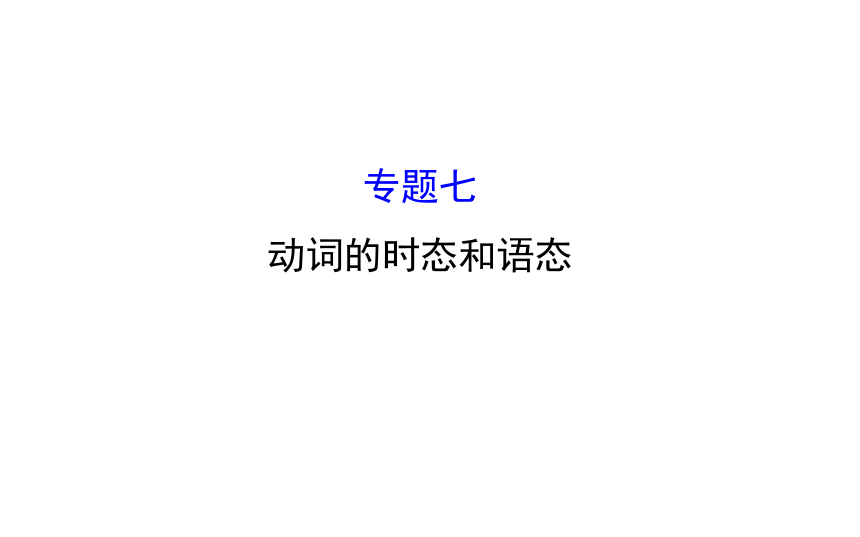
|
|
| 格式 | zip | ||
| 文件大小 | 93.3KB | ||
| 资源类型 | 教案 | ||
| 版本资源 | 通用版 | ||
| 科目 | 英语 | ||
| 更新时间 | 2016-05-22 09:28:53 | ||
图片预览




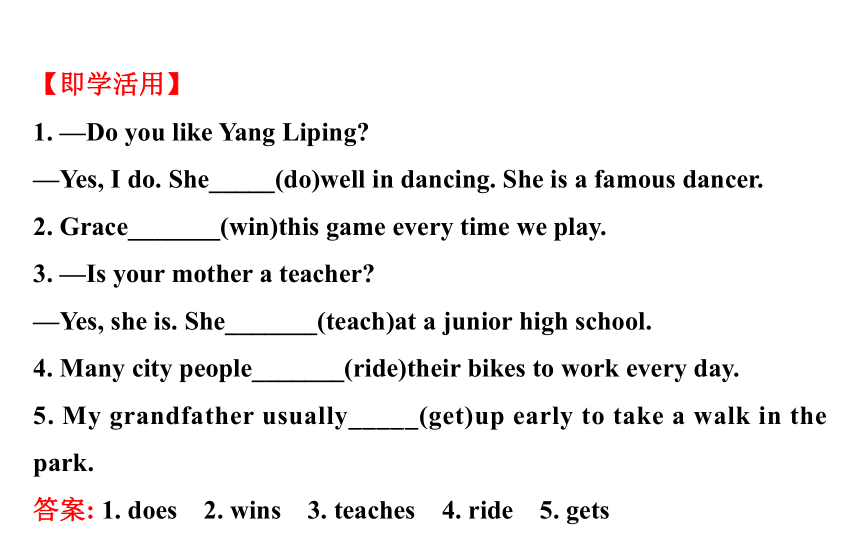
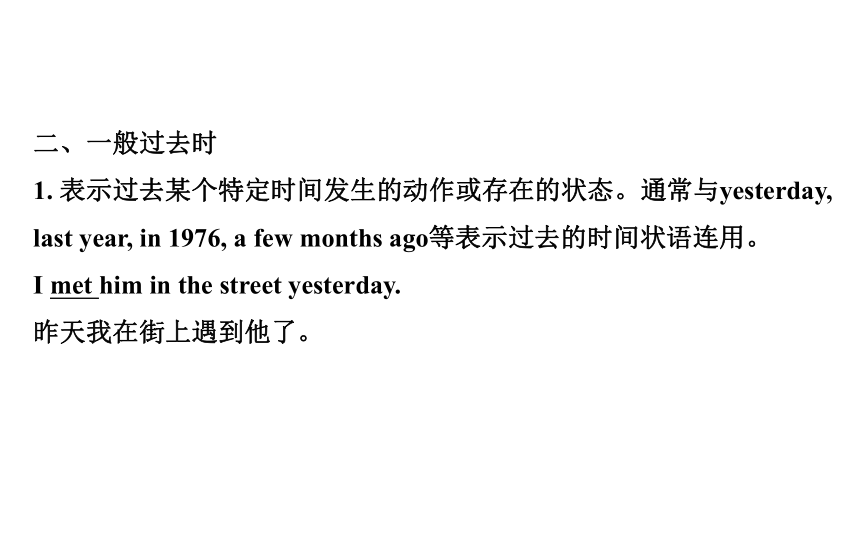
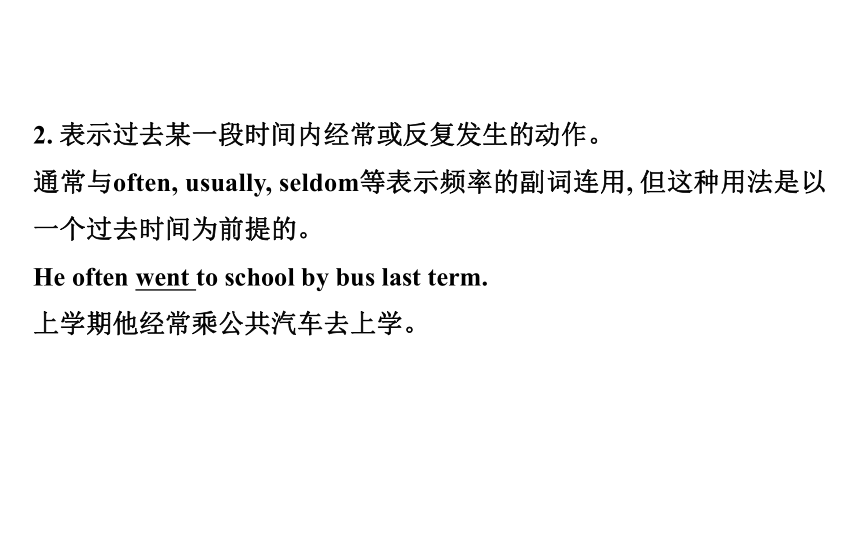
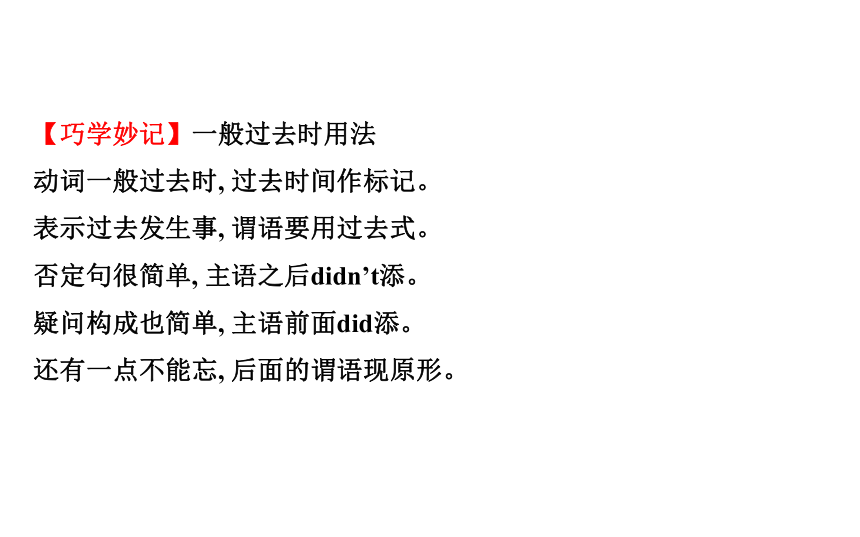


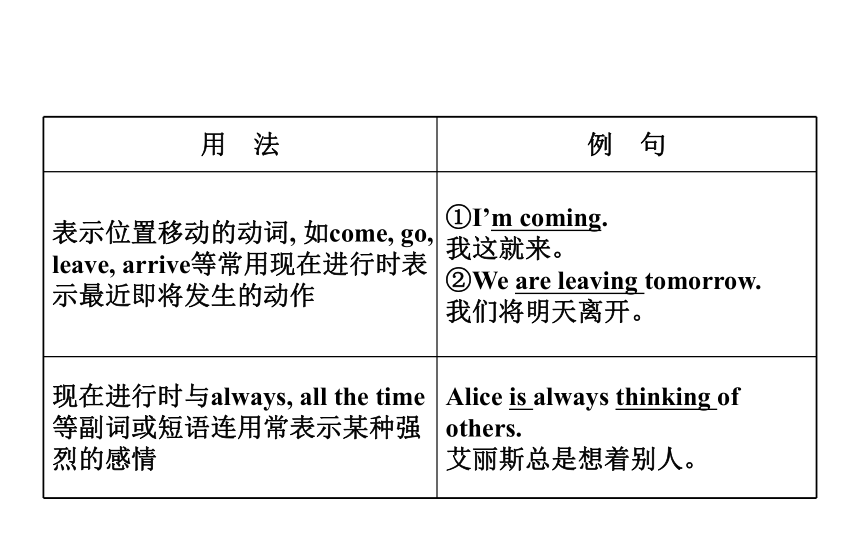
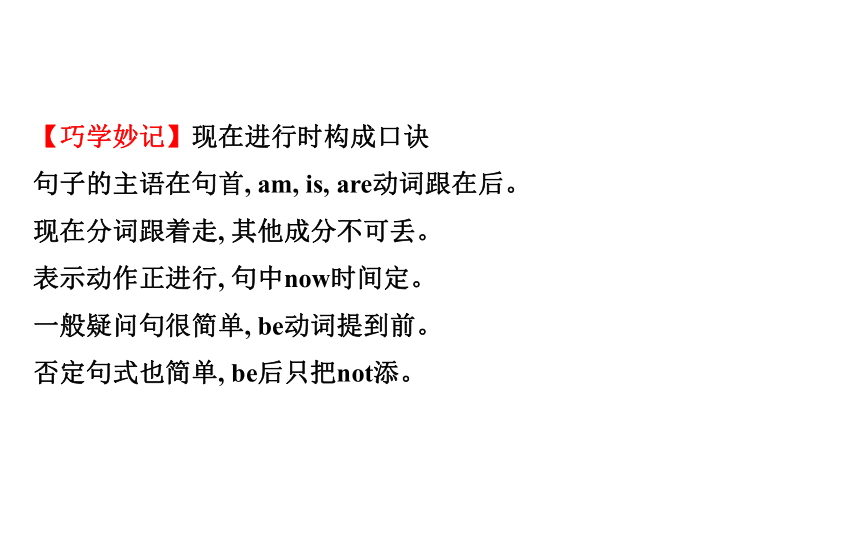
文档简介
课件39张PPT。专题七
动词的时态和语态一、一般现在时【巧学妙记】
学习一般现在时, 基本用法要熟悉。
表示动作常发生, 特征性格和能力。
存在状态和习惯, 客观事实与真理。
如果主语是单三, 谓语就要变一变。 【即学活用】
1. —Do you like Yang Liping?
—Yes, I do. She_____(do)well in dancing. She is a famous dancer.
2. Grace_______(win)this game every time we play.
3. —Is your mother a teacher?
—Yes, she is. She_______(teach)at a junior high school.
4. Many city people_______(ride)their bikes to work every day.
5. My grandfather usually_____(get)up early to take a walk in the park.
答案: 1. does 2. wins 3. teaches 4. ride 5. gets二、一般过去时
1. 表示过去某个特定时间发生的动作或存在的状态。通常与yesterday, last year, in 1976, a few months ago等表示过去的时间状语连用。
I met him in the street yesterday.
昨天我在街上遇到他了。2. 表示过去某一段时间内经常或反复发生的动作。
通常与often, usually, seldom等表示频率的副词连用, 但这种用法是以一个过去时间为前提的。
He often went to school by bus last term.
上学期他经常乘公共汽车去上学。【巧学妙记】一般过去时用法
动词一般过去时, 过去时间作标记。
表示过去发生事, 谓语要用过去式。
否定句很简单, 主语之后didn’t添。
疑问构成也简单, 主语前面did添。
还有一点不能忘, 后面的谓语现原形。【即学活用】
1. John_______(visit)his grandma every day when she was in hospital.
2. —I_______(go)to the cinema yesterday.
—It’s a pity. You didn’t invite me.
3. —A nice car! Is it yours?
—No, it isn’t. I_______(borrow)it from a friend of mine two days ago.
4. —When__________you________(come)here?
—Two days ago.
5. —Did you go to Nanhu Park a week ago?
—Yes. We________(have)a good time there.
答案: 1. visited 2. went 3. borrowed 4. did; come 5. had三、现在进行时【巧学妙记】现在进行时构成口诀
句子的主语在句首, am, is, are动词跟在后。
现在分词跟着走, 其他成分不可丢。
表示动作正进行, 句中now时间定。
一般疑问句很简单, be动词提到前。
否定句式也简单, be后只把not添。【即学活用】
1. —Cathy, can you answer the door? I________(clean)the room.
—I’m coming, mum.
2. —Mum, where is Dad?
—He_______(plant)flowers in the garden now.
3. We’re proud that China______(become)stronger and stronger these years. 4. —Hi, Wang Ning! How’s the weather in Zibo now?
—It is terrible. It______(rain)all the morning.
5. Now Jerry_____ (discuss)the exchange programme with his classmates in the meeting room.
答案: 1. am cleaning 2. is planting 3. is becoming
4. is raining 5. is discussing四、过去进行时 在含有时间状语从句的复合句中, 延续时间较长的动作用过去进行时, 另一个短暂性动作用一般过去时。例如:
My pen dropped on the ground when I was walking in the park. 在公园散步的时候, 我的钢笔掉到地上了。
表示两个延续性动作在过去某一时刻同时进行, 不考虑动作的先后顺序, 主句和从句的谓语动词都用过去进行时, 连词常用while。例如:
The students were reading while the teacher was grading their homework. 学生们在看书, 而老师在批改他们的家庭作业。【即学活用】
1. —Miss Lin_____(help)my deskmate with her lessons when I left school.
—She is really a nice teacher.
2. I saw Jeff in the park. He______(sit)on the grass and reading a book.
3. Tim Cook called his mother every week even while he ______ (travel) around the world.
4. —I called you at eight o’clock last night, but nobody answered.
—Oh, I_______(take)a shower at that time. 5. —Our classmates went to a concert yesterday afternoon.
—What a pity! I__________(do)my homework.
答案: 1. was helping 2. was sitting 3. was traveling
4. was taking 5. was doing五、一般将来时
1. 一般将来时的构成。
(1)will +动词原形(主语是第一人称时也可用shall +动词原形)
(2)be(am, is, are)going to +动词原形2. 一般将来时的用法。
(1)表示在将来某个时间将要发生的动作或存在的状态。常与tomorrow, soon, later, next time, in+一段时间等连用。例如:
I’ll start tomorrow. 我明天动身。
(2)“be going to +动词原形”用于表示主观上打算将来要做某事, 这种打算往往是事先安排好的或表示可能要发生或肯定要发生的事情。例如:
She has bought some cloth and she is going to make herself a dress.
她买了一些布, 准备为自己做一件连衣裙。【巧学妙记】一般将来时用法歌诀
一般将来时, 将要发生事。
谓语不一般, will加动原。
要变一般疑问句, will放在主语前。
否定句也不难, will后面not添。【温馨提示】一般将来时的其他表达方式【即学活用】
1. We______ (have)some robots at home in the future, and there______(be)some in the office, too.
2. I_____(go)to the shops. Can I get you anything?
3. Neither the headmaster nor the teachers______take a vacation next week. 4. —Do you have any plans for tonight?
—Yes, I_______(eat)at the new Italian restaurant in town.
5. —Have you finished the poster for the party?
—Not yet. I_______(finish)it in two days.
答案: 1. will/are going to have; will/are going to be
2. am going/will go 3. will/are going to 4. will/am going to eat
5. will/am going to finish六、现在完成时
1. 表示说话之前已经完成了的动作, 而且这个动作对现在仍有影响, 常与already, yet, in the past few years等时间状语连用。
I have seen the film already.
我已经看过这部电影了。(已知电影内容)
2. 表示过去已经开始, 持续到现在的动作或状态, 常与by now, so far, since/for等时间状语连用。
I have studied in the school since 2009.
自从2009年我就在这所学校学习。3. 一般过去时与现在完成时的区别。【巧学妙记】现在完成时的用法
英语现在完成时, 谓语结构要牢记;
“have/has+过去分词”主要用法有两个;
动作发生在过去, 结果影响到现在;
常用just, already, 过去的动作或状态;
一直延续到现在, for和since把时间带。【即学活用】
1. Monica, you__________(pass)the exam! Congratulations!
2. My grandparents__________(live)in that city since 2008.
3. I______ (read)the book Little Woman, but I’ll let you read it first.
4. So far, the AIIB(亚投行)_______(attract)57 countries to be the founding members.
5. Lei Feng______ (dead)for many years, but his spirit is still encouraging us.
答案: 1. have passed 2. have lived 3. haven’t read
4. has attracted 5. has been dead七、过去完成时
1. 过去完成时的构成: 主语+had+过去分词。
2. 过去完成时的用法:
(1)表示过去某一时间或动作之前已经发生或完成了的动作(即“过去的过去”)。因此使用过去完成时必须以过去某一时间作为前提, 通常用by, before短语或when, before, after, until等引导的从句来表示。例如:
After the sun had set, we decided to return home.
太阳落山以后, 我们决定回家。(2)用于宾语从句, 从句表示在主句以前发生的动作。
She wondered who had left the door open.
她想知道是谁让门开着的。(3)现在完成时与过去完成时的区别。
现在完成时与过去完成时的用法相同, 只是作为衡量标准的时间不同; 现在完成时是以现在这个时刻作为衡量标准, 而过去完成时是以过去某个时间作为衡量标准。
He has travelled to most of the cities in China in the past five years.
五年来他已经游遍了中国的大多数城市。
When we got there, the football match had already started.
当我们赶到那里时, 足球比赛已经开始了。【即学活用】
1. —Why were you late for school yesterday?
—I overslept. By the time I got to the bus stop, the bus_________
already__________(leave).
2. The meeting__________(be)on for ten minutes by the time I got there.
3. I didn’t go to the movie because I__________(see)it before.
答案: 1. had; left 2. had been 3. had seen八、各种时态的被动语态
被动语态由“主语+be+及物动词的过去分词”构成, 助动词有时态、人称和数的变化。【即学活用】
1. Everybody__________(move)deeply after they heard the story.
2. Over $30, 000_______(raise)for a children’s hospital by a British girl several months ago.
3. —Lily, will you go to Jenny’s birthday party this Saturday?
—I’m not sure. Because I_____ (not, invite)so far.
4. Tourists’bad behavior_______(record)by the government in our country from now on.
5. Teenagers should______(educate)to take care of themselves from a young age.
答案: 1. was moved 2. was raised 3. haven’t been invited
4. will be recorded 5. be educated九、特殊形式的被动语态
1. 主动句中感官动词see/hear/watch/feel等和使役动词make/let/have等后跟省略to的动词不定式, 变为被动语态时应加上不定式符号to。
We saw an alien get out of the UFO.
→An alien was seen to get out of the UFO.
2. 句中谓语是动词短语时, 变为被动语态时要注意其完整性。
Jack turned on the TV just now.
→The TV was turned on by Jack just now. 3. 主动表被动。
(1)feel, look, sound, smell, taste等系动词的主动语态表示被动含义。
The dishes smell so delicious.
菜闻起来真香。
(2)有些动词, 如sell, cut, drive, wash, clean, write, open, lock等, 作为不及物动词时可以用主动语态表示被动含义。
Books of Harry Potter sell well.
《哈利·波特》系列的书很畅销。【即学活用】
1. The girl was made__________(wash)her brother’s clothes.
2. Everything__________(change)in our school since 2011. Now, it looks very modern.
3. The young man was often seen__________(draw)by the lake.
答案: 1. to wash 2. has changed 3. to draw
动词的时态和语态一、一般现在时【巧学妙记】
学习一般现在时, 基本用法要熟悉。
表示动作常发生, 特征性格和能力。
存在状态和习惯, 客观事实与真理。
如果主语是单三, 谓语就要变一变。 【即学活用】
1. —Do you like Yang Liping?
—Yes, I do. She_____(do)well in dancing. She is a famous dancer.
2. Grace_______(win)this game every time we play.
3. —Is your mother a teacher?
—Yes, she is. She_______(teach)at a junior high school.
4. Many city people_______(ride)their bikes to work every day.
5. My grandfather usually_____(get)up early to take a walk in the park.
答案: 1. does 2. wins 3. teaches 4. ride 5. gets二、一般过去时
1. 表示过去某个特定时间发生的动作或存在的状态。通常与yesterday, last year, in 1976, a few months ago等表示过去的时间状语连用。
I met him in the street yesterday.
昨天我在街上遇到他了。2. 表示过去某一段时间内经常或反复发生的动作。
通常与often, usually, seldom等表示频率的副词连用, 但这种用法是以一个过去时间为前提的。
He often went to school by bus last term.
上学期他经常乘公共汽车去上学。【巧学妙记】一般过去时用法
动词一般过去时, 过去时间作标记。
表示过去发生事, 谓语要用过去式。
否定句很简单, 主语之后didn’t添。
疑问构成也简单, 主语前面did添。
还有一点不能忘, 后面的谓语现原形。【即学活用】
1. John_______(visit)his grandma every day when she was in hospital.
2. —I_______(go)to the cinema yesterday.
—It’s a pity. You didn’t invite me.
3. —A nice car! Is it yours?
—No, it isn’t. I_______(borrow)it from a friend of mine two days ago.
4. —When__________you________(come)here?
—Two days ago.
5. —Did you go to Nanhu Park a week ago?
—Yes. We________(have)a good time there.
答案: 1. visited 2. went 3. borrowed 4. did; come 5. had三、现在进行时【巧学妙记】现在进行时构成口诀
句子的主语在句首, am, is, are动词跟在后。
现在分词跟着走, 其他成分不可丢。
表示动作正进行, 句中now时间定。
一般疑问句很简单, be动词提到前。
否定句式也简单, be后只把not添。【即学活用】
1. —Cathy, can you answer the door? I________(clean)the room.
—I’m coming, mum.
2. —Mum, where is Dad?
—He_______(plant)flowers in the garden now.
3. We’re proud that China______(become)stronger and stronger these years. 4. —Hi, Wang Ning! How’s the weather in Zibo now?
—It is terrible. It______(rain)all the morning.
5. Now Jerry_____ (discuss)the exchange programme with his classmates in the meeting room.
答案: 1. am cleaning 2. is planting 3. is becoming
4. is raining 5. is discussing四、过去进行时 在含有时间状语从句的复合句中, 延续时间较长的动作用过去进行时, 另一个短暂性动作用一般过去时。例如:
My pen dropped on the ground when I was walking in the park. 在公园散步的时候, 我的钢笔掉到地上了。
表示两个延续性动作在过去某一时刻同时进行, 不考虑动作的先后顺序, 主句和从句的谓语动词都用过去进行时, 连词常用while。例如:
The students were reading while the teacher was grading their homework. 学生们在看书, 而老师在批改他们的家庭作业。【即学活用】
1. —Miss Lin_____(help)my deskmate with her lessons when I left school.
—She is really a nice teacher.
2. I saw Jeff in the park. He______(sit)on the grass and reading a book.
3. Tim Cook called his mother every week even while he ______ (travel) around the world.
4. —I called you at eight o’clock last night, but nobody answered.
—Oh, I_______(take)a shower at that time. 5. —Our classmates went to a concert yesterday afternoon.
—What a pity! I__________(do)my homework.
答案: 1. was helping 2. was sitting 3. was traveling
4. was taking 5. was doing五、一般将来时
1. 一般将来时的构成。
(1)will +动词原形(主语是第一人称时也可用shall +动词原形)
(2)be(am, is, are)going to +动词原形2. 一般将来时的用法。
(1)表示在将来某个时间将要发生的动作或存在的状态。常与tomorrow, soon, later, next time, in+一段时间等连用。例如:
I’ll start tomorrow. 我明天动身。
(2)“be going to +动词原形”用于表示主观上打算将来要做某事, 这种打算往往是事先安排好的或表示可能要发生或肯定要发生的事情。例如:
She has bought some cloth and she is going to make herself a dress.
她买了一些布, 准备为自己做一件连衣裙。【巧学妙记】一般将来时用法歌诀
一般将来时, 将要发生事。
谓语不一般, will加动原。
要变一般疑问句, will放在主语前。
否定句也不难, will后面not添。【温馨提示】一般将来时的其他表达方式【即学活用】
1. We______ (have)some robots at home in the future, and there______(be)some in the office, too.
2. I_____(go)to the shops. Can I get you anything?
3. Neither the headmaster nor the teachers______take a vacation next week. 4. —Do you have any plans for tonight?
—Yes, I_______(eat)at the new Italian restaurant in town.
5. —Have you finished the poster for the party?
—Not yet. I_______(finish)it in two days.
答案: 1. will/are going to have; will/are going to be
2. am going/will go 3. will/are going to 4. will/am going to eat
5. will/am going to finish六、现在完成时
1. 表示说话之前已经完成了的动作, 而且这个动作对现在仍有影响, 常与already, yet, in the past few years等时间状语连用。
I have seen the film already.
我已经看过这部电影了。(已知电影内容)
2. 表示过去已经开始, 持续到现在的动作或状态, 常与by now, so far, since/for等时间状语连用。
I have studied in the school since 2009.
自从2009年我就在这所学校学习。3. 一般过去时与现在完成时的区别。【巧学妙记】现在完成时的用法
英语现在完成时, 谓语结构要牢记;
“have/has+过去分词”主要用法有两个;
动作发生在过去, 结果影响到现在;
常用just, already, 过去的动作或状态;
一直延续到现在, for和since把时间带。【即学活用】
1. Monica, you__________(pass)the exam! Congratulations!
2. My grandparents__________(live)in that city since 2008.
3. I______ (read)the book Little Woman, but I’ll let you read it first.
4. So far, the AIIB(亚投行)_______(attract)57 countries to be the founding members.
5. Lei Feng______ (dead)for many years, but his spirit is still encouraging us.
答案: 1. have passed 2. have lived 3. haven’t read
4. has attracted 5. has been dead七、过去完成时
1. 过去完成时的构成: 主语+had+过去分词。
2. 过去完成时的用法:
(1)表示过去某一时间或动作之前已经发生或完成了的动作(即“过去的过去”)。因此使用过去完成时必须以过去某一时间作为前提, 通常用by, before短语或when, before, after, until等引导的从句来表示。例如:
After the sun had set, we decided to return home.
太阳落山以后, 我们决定回家。(2)用于宾语从句, 从句表示在主句以前发生的动作。
She wondered who had left the door open.
她想知道是谁让门开着的。(3)现在完成时与过去完成时的区别。
现在完成时与过去完成时的用法相同, 只是作为衡量标准的时间不同; 现在完成时是以现在这个时刻作为衡量标准, 而过去完成时是以过去某个时间作为衡量标准。
He has travelled to most of the cities in China in the past five years.
五年来他已经游遍了中国的大多数城市。
When we got there, the football match had already started.
当我们赶到那里时, 足球比赛已经开始了。【即学活用】
1. —Why were you late for school yesterday?
—I overslept. By the time I got to the bus stop, the bus_________
already__________(leave).
2. The meeting__________(be)on for ten minutes by the time I got there.
3. I didn’t go to the movie because I__________(see)it before.
答案: 1. had; left 2. had been 3. had seen八、各种时态的被动语态
被动语态由“主语+be+及物动词的过去分词”构成, 助动词有时态、人称和数的变化。【即学活用】
1. Everybody__________(move)deeply after they heard the story.
2. Over $30, 000_______(raise)for a children’s hospital by a British girl several months ago.
3. —Lily, will you go to Jenny’s birthday party this Saturday?
—I’m not sure. Because I_____ (not, invite)so far.
4. Tourists’bad behavior_______(record)by the government in our country from now on.
5. Teenagers should______(educate)to take care of themselves from a young age.
答案: 1. was moved 2. was raised 3. haven’t been invited
4. will be recorded 5. be educated九、特殊形式的被动语态
1. 主动句中感官动词see/hear/watch/feel等和使役动词make/let/have等后跟省略to的动词不定式, 变为被动语态时应加上不定式符号to。
We saw an alien get out of the UFO.
→An alien was seen to get out of the UFO.
2. 句中谓语是动词短语时, 变为被动语态时要注意其完整性。
Jack turned on the TV just now.
→The TV was turned on by Jack just now. 3. 主动表被动。
(1)feel, look, sound, smell, taste等系动词的主动语态表示被动含义。
The dishes smell so delicious.
菜闻起来真香。
(2)有些动词, 如sell, cut, drive, wash, clean, write, open, lock等, 作为不及物动词时可以用主动语态表示被动含义。
Books of Harry Potter sell well.
《哈利·波特》系列的书很畅销。【即学活用】
1. The girl was made__________(wash)her brother’s clothes.
2. Everything__________(change)in our school since 2011. Now, it looks very modern.
3. The young man was often seen__________(draw)by the lake.
答案: 1. to wash 2. has changed 3. to draw
同课章节目录
- 词法
- 名词
- 动词和动词短语
- 动词语态
- 动词时态
- 助动词和情态动词
- 非谓语动词
- 冠词
- 代词
- 数词和量词
- 形容词副词及其比较等级
- 介词和介词短语
- 连词和感叹词
- 构词法
- 相似、相近词比较
- 句法
- 陈述句
- 一般疑问句和否定疑问句
- 特殊疑问句及选择疑问句
- 反意疑问句
- 存在句(There be句型)
- 宾语从句
- 定语从句
- 状语从句
- 主谓一致问题
- 简单句
- 并列句
- 复合句
- 主谓一致
- 主、表语从句
- 名词性从句
- 直接引语和间接引语
- 虚拟语气
- 感叹句
- 强调句
- 倒装句
- 祈使句
- 句子的成分
- 句子的分类
- 题型专区
- 单项选择部分
- 易错题
- 完形填空
- 阅读理解
- 词汇练习
- 听说训练
- 句型转换
- 补全对话
- 短文改错
- 翻译
- 书面表达
- 任务型阅读
- 语法填空
- 其他资料
